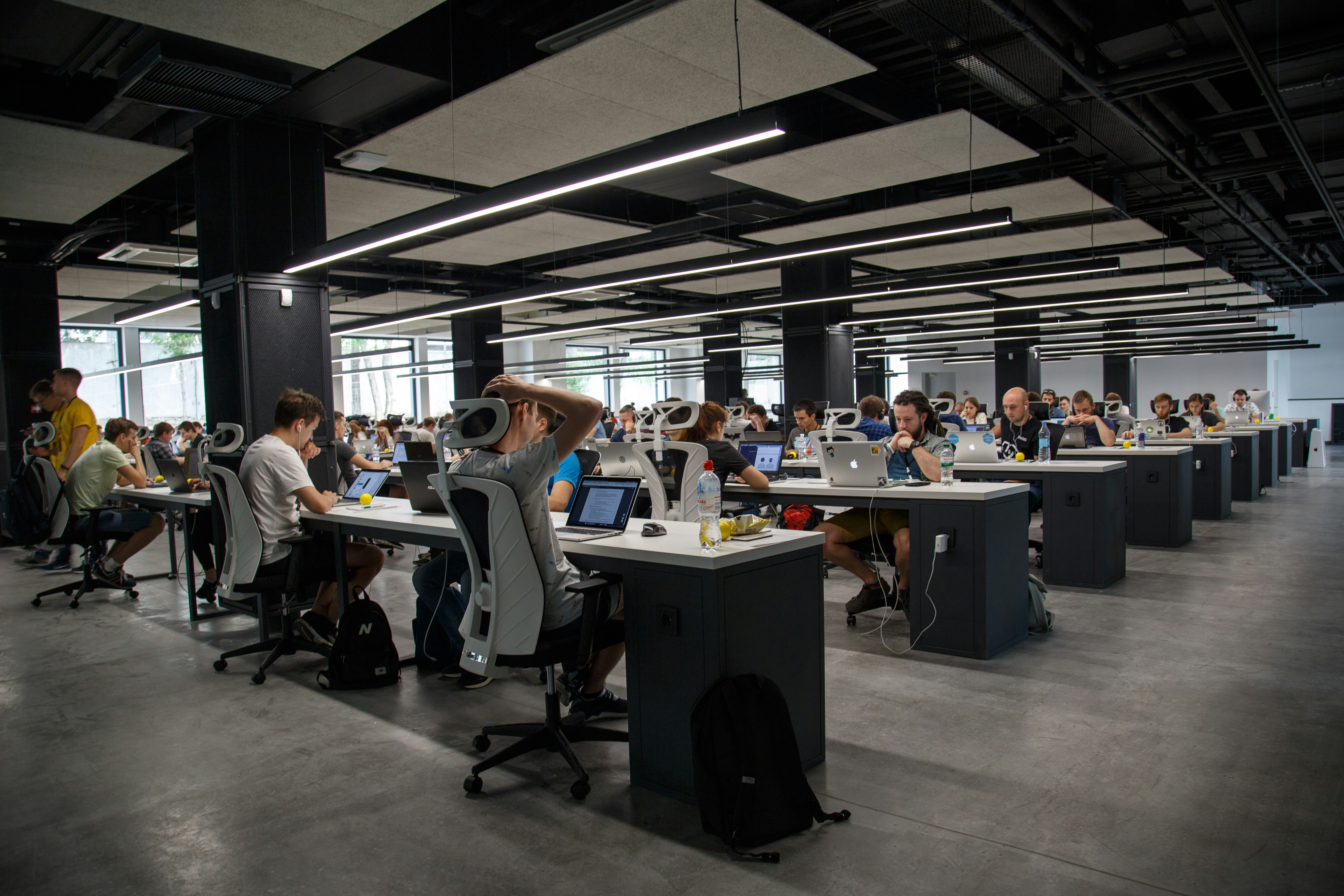The Impact of Artificial Intelligence on Business and the Future of Work

The rapid rise of artificial intelligence in business is reshaping industries, redefining how companies operate, and transforming the very nature of jobs. From automating repetitive tasks to enhancing customer experiences and providing data-driven insights, AI is no longer a futuristic concept—it is a reality that businesses must embrace. Understanding the AI impact on organizations and the future of work is essential for entrepreneurs, managers, and employees who want to remain competitive in an evolving marketplace.
One of the most significant aspects of AI adoption is business automation. By streamlining operations, reducing costs, and increasing efficiency, automation creates opportunities for companies to scale while allowing human workers to focus on creativity, strategy, and innovation. This article explores the opportunities and challenges AI brings to businesses and workers, offering practical insights into how to thrive in this new era of digital transformation.
Artificial Intelligence in Business: A Transformative Force
Integrating artificial intelligence in business is not just about adopting new technologies; it is about reinventing processes and creating new value. Companies across industries are already benefiting from AI in multiple ways:
- Customer service: AI-powered chatbots and virtual assistants provide 24/7 support, improving customer satisfaction and reducing wait times.
- Marketing: Predictive analytics personalize campaigns, increasing conversion rates and ROI.
- Finance: Fraud detection and algorithmic trading enhance security and profitability.
- Healthcare: AI assists in diagnostics, treatment recommendations, and patient care management.
These examples highlight the broad AI impact on industries, proving that businesses that embrace innovation are better positioned to succeed in the future of work.
How Business Automation Is Reshaping Work
Business automation powered by AI is revolutionizing efficiency. Tasks once requiring hours of manual input are now completed in seconds. For example, data entry, payroll management, and supply chain optimization are increasingly automated. While this boosts productivity, it also sparks debates about job displacement. However, automation is not simply replacing workers—it is creating new opportunities for higher-value roles.
Companies adopting artificial intelligence in business often find that employees can shift focus toward critical thinking, innovation, and customer engagement. The key lies in reskilling the workforce to align with the demands of the digital age, ensuring that automation complements human creativity instead of undermining it.
AI Impact on Workforce Roles and Skills
The AI impact on employment is one of the most discussed aspects of digital transformation. While some fear widespread job losses, the reality is more nuanced. AI eliminates certain repetitive roles but simultaneously creates demand for new positions in data science, AI development, cybersecurity, and digital strategy.
To remain competitive in the future of work, professionals must cultivate skills that machines cannot easily replicate, such as:
- Critical thinking: Analyzing data to make strategic business decisions.
- Creativity: Innovating new solutions and designing unique customer experiences.
- Emotional intelligence: Managing teams, resolving conflicts, and building relationships.
- Technical expertise: Gaining knowledge in AI tools, programming, and data analytics.
The workforce of tomorrow will thrive by balancing technological literacy with uniquely human capabilities.
Artificial Intelligence and the Future of Work
The future of work is inseparable from artificial intelligence in business. Organizations are adopting hybrid models where humans and AI collaborate seamlessly. Examples include decision-support systems that guide managers, predictive algorithms that forecast consumer behavior, and robotic process automation that streamlines back-office functions.
Looking ahead, work will become increasingly flexible, digital, and skill-driven. Companies that invest in reskilling employees and integrating business automation responsibly will lead the way. Meanwhile, individuals who embrace lifelong learning will be best positioned to thrive in the evolving workforce.
Benefits of Artificial Intelligence in Business
The advantages of adopting AI go far beyond cost savings. Businesses using AI benefit from:
- Increased efficiency: Automating repetitive tasks accelerates workflows.
- Improved accuracy: AI reduces human error in areas like accounting and data entry.
- Enhanced decision-making: Predictive analytics and big data empower smarter business choices.
- Personalization: Tailored experiences boost customer loyalty and sales.
- Scalability: Companies can grow rapidly without proportionally increasing labor costs.
These benefits illustrate why artificial intelligence in business has become a competitive necessity rather than an optional upgrade.
Challenges of AI Adoption
Despite its promise, adopting AI comes with challenges. Businesses must address the ethical, financial, and organizational implications of AI impact. Common challenges include:
- High initial costs: Implementing AI requires significant investment in infrastructure and expertise.
- Data privacy concerns: Collecting and analyzing personal data raises ethical and regulatory issues.
- Workforce resistance: Employees may fear job loss or struggle with new technologies.
- Bias in algorithms: AI systems can inherit biases from the data used to train them.
Addressing these challenges requires transparency, strong governance, and investment in employee training to ensure that business automation benefits both organizations and society.
AI and the Global Business Landscape
The adoption of artificial intelligence in business varies worldwide, but its influence is global. In developed economies, AI drives innovation in finance, healthcare, and retail. In emerging markets, it supports agricultural efficiency, logistics optimization, and mobile-based services. The AI impact on global supply chains highlights the interconnected nature of modern business, where efficiency gains in one region affect competitiveness in another.
As businesses expand internationally, the ability to implement AI responsibly across diverse markets will shape the future of work on a global scale.
Preparing for the AI-Driven Future
Businesses and individuals must prepare for the AI-driven world by focusing on adaptability, continuous learning, and ethical considerations. Key strategies include:
- Investing in workforce training: Equip employees with skills to complement AI technologies.
- Encouraging innovation: Foster a culture that rewards experimentation and creativity.
- Prioritizing ethics: Develop policies that ensure responsible use of AI.
- Leveraging partnerships: Collaborate with technology providers to stay at the forefront of innovation.
By proactively addressing the challenges and opportunities of artificial intelligence in business, organizations can secure a strong position in the evolving marketplace.
FAQ on Artificial Intelligence and the Future of Work
What is the main AI impact on businesses?
AI improves efficiency, decision-making, and customer experiences while reducing costs through automation.
Will AI replace jobs completely?
AI will replace some roles, but it will also create new opportunities, especially in technology, creativity, and management.
How does business automation benefit companies?
It streamlines operations, reduces errors, and allows employees to focus on higher-value tasks.
What skills are important for the future of work?
Skills like critical thinking, emotional intelligence, and digital literacy are essential to complement AI-driven environments.
Is AI adoption possible for small businesses?
Yes, AI tools are becoming more affordable, enabling even small companies to benefit from automation and analytics.
Final Thoughts
The AI impact on businesses and the workforce is undeniable. By leveraging artificial intelligence in business, organizations gain efficiency, scalability, and innovation potential. At the same time, preparing for the future of work requires balancing automation with human skills, ensuring that employees adapt and thrive in this new environment. The companies and professionals that embrace business automation while investing in ethical, human-centered innovation will be the ones leading the future of global business.
How do you see AI shaping your industry in the next decade? Do you believe the future of work will be more human-driven or machine-led? Share your thoughts in the comments below!





GIPHY App Key not set. Please check settings